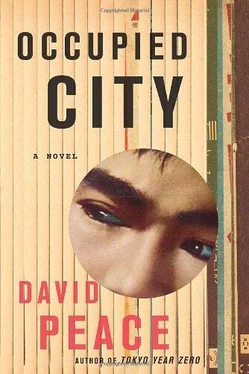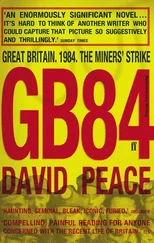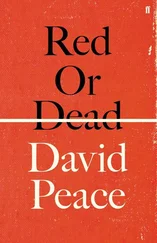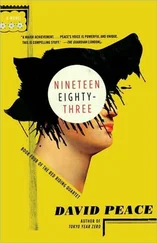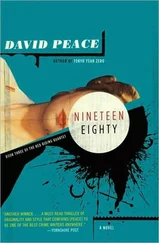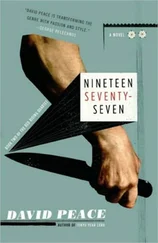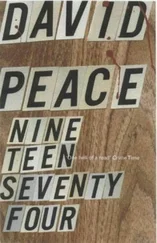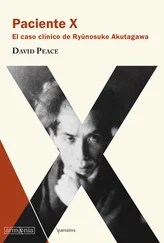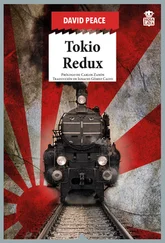At twenty minutes past three on Monday, 26 January 1948, in Tokyo, and I am drinking and I am drinking and I am drinking and I am drinking and I am drinking and I am drinking and I am drinking and I am drinking and I am drinking and I am drinking and I am drinking and I am drinking and now, now we run and we retch, we stagger and we stumble, and we begin to fall, to fall and to fall –
Infected, we are falling and falling –
We are falling. We are falling –
We are falling in tears –
In tears, the tears –
We are weeping. We are weeping –
We are weeping all the time –
Always, already weeping,
here. But in the Occupied City, it is twenty minutes past three,
now it is twenty-one minutes past three,
now twenty-two minutes past,
twenty-three minutes –
In the Occupied City, the minutes and the hours, the days and the weeks, the months and the years will pass. But in the Perplexed City, the Posthumous City, between two places, the minutes and the hours, the days and the weeks, the months and the years will not pass.
Here where it is always, already January, but where January is not January; here where it is always, already 1948,
but where 1948 is not 1948;
here where we do not age –
In the Perplexed City, in the Posthumous City,
it will always, already be twenty past three –
But still we watch you age, watch
you age, and watch you forget…
Here, where it is always, already twenty past three –
Here, where it will always, already be grey –
Into the greyness, I am falling, I am falling, I am falling, I am falling, I am falling, I am falling, I am falling, I am falling –
I am falling, I am falling –
I am falling –
Falling –
Here, into the Perplexed City, the Posthumous City, this city that is no city, into the grey place, this place that is no place,
we all fall, away from the light,
from the Occupied City,
we all fall, into the earth and into the sky,
we all fall, fall, fall –
From your city, into our coffins …
Twelve cheap wooden coffins –
Your city, our coffin …
Here, here –
In the snow. In the back of a truck. Parked outside the bank. In the sleet. Under the heavy damp tarpaulin. Driven through the streets. In the rain. To the hospital. To the morgue. In the sleet. To the mortuary. To the temple. In the snow. To the crematorium. To the earth and to the sky. In our twelve cheap wooden coffins –
Ash for hair, soil for skin, among the flakes and the sod / We defy the fire and the rake, the spade and the grave / The grave in the earth, the grave in the sky / In the abyss of the sky, in the abyss of the earth / Your earth, your sky. Not our sky, not
our earth / not here, not now /
Now into the heights, we
fall, into the depths …
These twelve cheap wooden coffins, in which we lie. But we do not lie still. In these twelve cheap wooden coffins, we are struggling. In the greyness, we are struggling. In this city, we are struggling. We are struggling and we are weeping, weeping the words:
Where is the law, we ask as we fall, from being into non-being, as we struggle, between one place and no place ,
as we weep, where is the law?
In the Ab-grund, in the Un-grund, the without ground, the non-ground / Here, other voices in this other-dom will speak this other-place with other-name –
In this un-place, in this un-city, between two places, in this other-dom / There are no swallows, no swallows fly here / Here, we shuffle across the carpet of their corpses, up and down, their bloated chests, their barren wings / Here, where their still eyes accuse us, yellow / Here, where their empty beaks stand open, yellow –
In this place of no place, we lie. It has a name
and it has none. So speak it,
now speak it: Caesura –
Between us –
In this place — no-place / un-place — this place called Caesura, named Caesura, this place that takes away our breath, this place that leaves us weeping. Always, weeping. Already, weeping –
You are deaf, you are dumb and you are blind ,
so you cannot and you will not hear us ,
cannot and will not help us ,
will you …
In the Perplexed City, the Posthumous City, in Caesura, always, already –
You will not help us, will you, dear writer?
The first candle blown out –
Always, already, out –
In-caesura, in-difference …
Beneath the Black Gate, in its upper chamber, in the occult circle, her white face falling and her red robes flailing, the medium is flat upon the floor before you now. The wind, the bell and the drum all silent now, the medium mute and prostrate upon the floor,
the blood and tear-splin-taint-ed floor –
In-difference and in-caesura …
The first candle extinguished,
the medium exhausted –
Un-in-corpor-ated…
Possessed no more, you are alone here. Here in the Occupied City, alone and deaf, dumb and blind –
Yet still you try to write,
to pick up your pen,
to write again
here. Here in this place between the things you did and the things you did not do, between the things you felt and the things you did not feel, the things you said and the things you did not say,
here in this place between the done and the un-done, the felt and the un-felt, the said and the un-said –
Yet still you try to write,
to write again
here–
But here the done can never be un-done,
the un-done never done –
Here the felt can never be un-felt,
the un-felt never felt –
The said never be un-said,
the un-said never
said–
Here where you know the written can never be un-written,
and where you fear — fear, fear, fear — the un-written,
the un-written can never be written,
the un-written never written
here. Here where your see-ing is fading, now as your hear-ing is failing. Here and now where nightmares and headaches curse your days and nights. Here and now as you mistake the sun for the moon, moonlight for sunshine, sun-fall for rain-shine,
life for death, cough-cough,
death for birth. Here –
In this occult circle of the eleven candles, in this upper chamber of the Black Gate, you cough and you cough-cough, see-fading and hear-failing, you cough and you cough-cough, blood-blots and tear-traces here. Here among the blank tears and the falling papers, you are coughing, cough-cough, and now you are spinning, spinning and spinning, unable to write, unable to see,
still half-deaf to the foot-stair-steps,
to the sirens and the telephones –
‘No more tears,’ whispers a voice, the voice of an old man. ‘No more tears, no more tears for him …’
You drop your pen, your ink-dry-pen. You open your eyes, your red-dry-eyes. The eleven candles have gone, the Black Gate has gone, the Occupied City has gone. You are standing in a shed, or a barn, with the earth-smell, the damp-smell. You are watching an elderly man opening up cardboard boxes, taking out files, dust-webbed and cob-covered, the elderly man leafing through papers and documents, documents and notebooks, notebooks upon notebooks –
‘It was many years ago,’ the old man is saying. ‘Not so many people left now who remember what the Teigin case was really like.
‘But I remember. Because I was in the Murder Room; Room #2 of the First Investigative Division of the Tokyo Metropolitan Police Board. And Room #2 was in charge of all murders.
‘The head of our division was Suzuki and the head of our room was Minegishi…
Читать дальше
